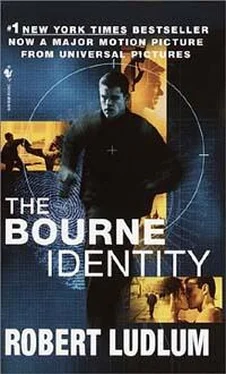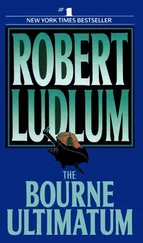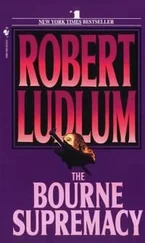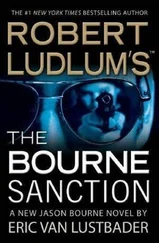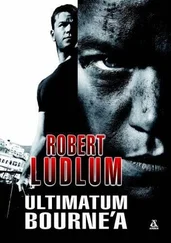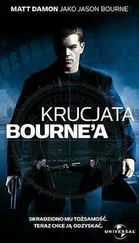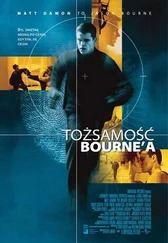“Fourteen, monsieur. They will be fitted, of course.”
“I’m afraid not, but I’m sure there are decent tailors in Cap-Ferrat.”
“Naturellement,” conceded the woman quickly.
“Also …” Bourne hesitated, frowning again. “While I’m here, and to save time, select a few others for me along these lines. Different prints, different cuts, but related, if that makes sense.”
“Very good sense, monsieur.”
“Thanks, I appreciate it. I’ve had a long flight from the Bahamas and I’m exhausted.”
“Would monsieur care to sit down then?”
“Frankly, monsieur would care for a drink.”
“It can be arranged, of course. As to the method of payment, monsieur … ?”
“Je paierai cash, I think,” said Jason, aware that the exchange of merchandise for hard currency would appeal to the overseer of Les Classiques. “Checks and accounts are like spoors in the forest, aren’t they?”
“You are as wise as you are discriminating.” The rigid smile cracked the mask again, the eyes in no way related. “About that drink, why not my office? It’s quite private; you can relax and I shall bring you selections for your approval.”
“Splendid.”
“As to the price range, monsieur?”
“Les meilleurs, madame.”
“Naturellement.” A thin white hand was extended. “I am Jacqueline Lavier, managing partner of Les Classiques.”
“Thank you.” Bourne took the hand without offering a name. One might follow in less public surroundings, his expression said, but not at the moment. For the moment, money was his introduction. “Your office? Mine’s several thousand miles from here.”
“This way, monsieur.” The rigid smile appeared once more, breaking the facial mask like a sheet of progressively cracked ice. Madame Lavier gestured toward the staircase. The world of haute couture continued, its orbit uninterrupted by failure and death on the Quai de la Rapée.
That lack of interruption was as disturbing to Jason as it was bewildering. He was convinced the woman walking beside him was the carrier of lethal commands that had been aborted by gunfire an hour ago, the orders having been issued by a faceless man who demanded obedience or death. Yet there was not the slightest indication that a strand of her perfectly groomed hair had been disturbed by nervous fingers, no pallor on the chiseled mask that might be taken for fear. Yet there was no one higher at Les Classiques, no one else who would have a private number in a very private office.
Part of an equation was missing … but another had been disturbingly confirmed.
Himself. The chameleon. The charade had worked; he was in the enemy’s camp, convinced beyond doubt that he had not been recognized. The whole episode had a déjà vu quality about it. He had done such things before, experienced the feelings of similar accomplishment before. He was a man running through an unfamiliar jungle, yet somehow instinctively knowing his way, sure of where the traps were and how to avoid them. The chameleon was an expert.
They reached the staircase and started up the steps. Below on the right, the conservatively dressed, middle-aged operator was speaking quietly into the extended mouthpiece, nodding his gray-haired head almost wearily, as if assuring the party on the line that their world was as serene as it should be.
Bourne stopped on the seventh step, the pause involuntary. The back of the man’s head, the outline of the cheekbone, the sight of the thinning gray hair—the way it fell slightly over the ear; he had seen that man before! Somewhere. In the past, in the unremembered past, but remembered now in darkness … and with flashes of light. Explosions, mists; buffeting winds followed by silences filled with tension. What was it? Where was it? Why did the pain come to his eyes again? The gray-haired man began to turn in his swivel chair, Jason looked away before they made contact.
“I see monsieur is taken by our rather unique switchboard,” said Madame Lavier. “It’s a distinction we feel sets Les Classiques apart from the other shops on Saint-Honoré.”
“How so?” asked Bourne, as they proceeded up the steps, the pain in his eyes causing him to blink.
“When a client calls Les Classiques, the telephone is not answered by a vacuous female, but instead by a cultured gentleman who has all our information at his fingertips.”
“A nice touch.”
“Other gentlemen think so,” she added. “Especially when making telephone purchases they would prefer to keep confidential. There are no spoors in our forest, monsieur.” They reached Jacqueline Lavier’s spacious office. It was the lair of an efficient executive, scores of papers in separate piles on the desk, an easel against the wall holding watercolor sketches, some boldly initialed, others left untouched, obviously unacceptable. The walls were filled with framed photographs of the Beautiful People, their beauty too often marred by gaping mouths and smiles as false as the one on the mask of the inhabitant of the office. There was a bitch quality in the perfumed air, these were the quarters of an aging, pacing tigress, swift to attack any who threatened her possessions or the sating of her appetites. Yet she was disciplined; all things considered, an estimable liaison to Carlos.
Who was that man on the switchboard? Where had he seen him?
He was offered a drink from a selection of bottles; he chose brandy.
“Do sit down, monsieur. I shall enlist the help of René himself, if I can find him.”
“That’s very kind, but I’m sure whatever you choose will be satisfactory. I have an instinct about taste; yours is all through this office. I’m comfortable with it.”
“You’re too generous.”
“Only when it’s warranted,” said Jason, still standing. “Actually, I’d like to look around at the photographs. I see a number of acquaintances, if not friends. A lot of these faces pass through the Bahamian banks with considerable frequency.”
“I’m sure they do,” agreed Lavier, in a tone that bespoke regard for such avenues of finance. “I shan’t be long, monsieur.”
Nor would she, thought Bourne, as Les Classiques’ partner swept out of the office. Mme. Lavier was not about to allow a tired, wealthy mark too much time to think. She would return with the most expensive designs she could gather up as rapidly as possible. Therefore, if there was anything in the room that could shed light on Carlos’ intermediary—or on the assassin’s operation—it had to be found quickly. And, if it was there, it would be on or around the desk.
Jason circled behind the imperial chair in front of the wall, feigning amused interest in the photographs, but concentrating on the desk. There were invoices, receipts, and overdue bills, along with dunning letters of reprimand awaiting Lavier’s signature. An address book lay open, four names on the page; he moved closer to see more clearly. Each was the name of a company, the individual contacts bracketed, his or her positions underlined. He wondered if he should memorize each company, each contact. He was about to do so when his eyes fell on the edge of an index card. It was only the edge; the rest was concealed under the telephone itself. And there was something else—dull, barely discernible. A strip of transparent tape, running along the edge of the card, holding it in place. The tape itself was relatively new, recently stuck over the heavy paper and the gleaming wood; it was clean, no smudges or coiled borders or signs of having been there very long.
Instinct.
Bourne picked up the telephone to move it aside. It rang, the bell vibrating through his hand, the shrill sound unnerving. He replaced it on the desk and stepped away as a man in shirtsleeves rushed through the open door from the corridor. He stopped, staring at Bourne, his eyes alarmed but noncommittal. The telephone rang a second time; the man walked rapidly to the desk and picked up the receiver.
Читать дальше
